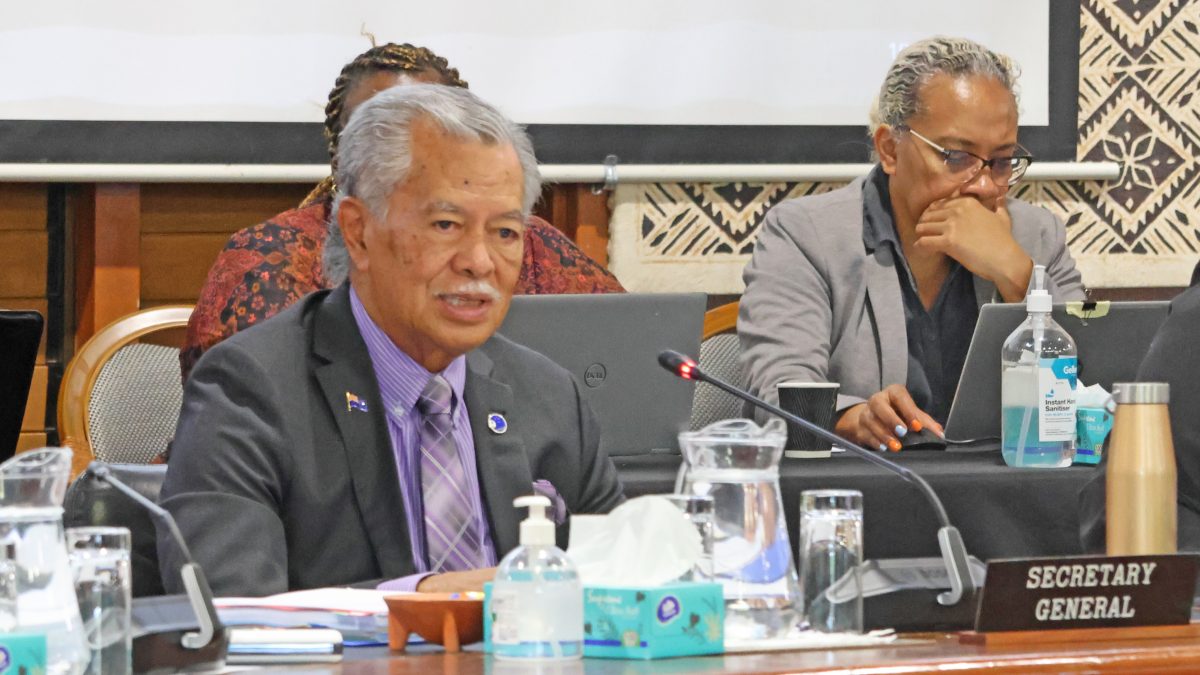Forum Secretary General, Henry Puna says the signing of the Samoa Agreement – the successor to the Cotonou Agreement next month will be a historic occasion for the Pacific sub-region.
Puna made the remarks at the Pacific ACP Trade Ministers Meeting at the Forum Secretariat in Suva.
“The Pacific ACP Ministers and high-level representatives from the 27 EU member states will meet in Samoa, less than six weeks from today, on 14/15 November, to sign the Samoa Agreement – the successor Agreement to the Cotonou Agreement.
“This will be a historic occasion for the Pacific sub-region in the Organisation of ACP States—a proud moment for our people.
We congratulate the Government of Samoa for holding the flag for the region on this occasion,” SG Puna told PACP Trade Ministers.
Puna said for the Pacific, the SPIRIT project is one of the four projects under the EU-funded PRISE programme, worth EUR 37 million (US$38.9 million), that is managed by the Pacific Islands Forum Secretariat.
“Since the recruitment of the project team in 2022, three Trade Advisers have been deployed to the three subregions based in the Federated States of Micronesia, Vanuatu, and Tonga.
In addition to the four parties of Fiji, PNG, Samoa, and the Solomon Islands, and the two observers of Tonga and Timor Leste, three more members, Niue, Tuvalu, and Vanuatu, have formally expressed their interest to accede to the IEPA and submitted market access offers,” he explained.
The PACP membership will likely increase from four to seven by the third quarter of 2024, all factors remaining constant, he said.
Puna said member states identified as many as 37 activities for technical support.
“Three have been completed, and a few more will be concluded over the next month. Seventeen are active, fifteen are in the procurement/contract stage, and only two have yet to be mobilised. As your Secretary General, I’m proud of these achievements and the work delivered to the members, barely into its mid-term.
But much work remains to be done. We cannot rest on our laurels and business as usual for the PACP members,” he emphasised.
SG Puna said several questions beg to be asked include:
*How do we tailor the Samoa Agreement to be aligned to the 2050 Strategy Implementation Plan to support our fifteen members? What existing and new synergies can be harnessed with the potential expanding membership of the EU Pacific Interim Economic Partnership Agreement? Is there a feasibility of expanding its scope to include trade in services?
*How can we similarly leverage the PICTA, MSGTA3, PACER Plus, and WTO to benefit Pacific businesses and communities and increase economic growth? What lessons can be learned from other trade agreements and tapping trade and investment synergies through closer engagement with existing and emerging key development partners? How can we mobilise the transition from signing and ratifying trade agreements to implementation on the ground that creates jobs, empower our women, attract sustainable foreign direct investment in critical sectors, and raise living standards for our members?
* How do we redefine our priority areas of cooperation with the European Union and other development partners, striking the strategic nexus between trade, investment, and sustainable development? As custodians of the Pacific Ocean, how do we pool our negotiating capital as a region at the multilateral level from harmful fisheries subsidies that dilute our capabilities to protect our marine ecosystem, which by extension, sustains our livelihoods, prosperity, and well-being on land?
*How do we build and sustain our resilience to the existential threats posed by climate change, which have dire implications for our sovereignty, territorial integrity, and our very existence? Are we doing enough? Can we do better as a collective in shaping global developments in this area?
The PACP Trade Ministers agenda for discussion today include Regional Trade and Investment Landscape, Comprehensive Review of Existing Regional Trade Agreements, the Pacific Regional Integration Support Programme (Prise), Multilateral Trade Issues: Update on the 13th WTO Ministerial (MC13) and WIPO IGC Negotiations on the Multilateral Treaties for Traditional Knowledge Protection and Trading opportunities with other Partners (ASEAN, CARICOM and COMESA)
“Our diverse economic and trade-related interests are as unique and distinct as our national identities. I’m confident, however, that despite these differences, we will seek out our common and shared interests to catapult our regional trade agenda to the next level after this meeting.
“Let’s not forget that trade, in all its nuances, whether cross-border or domestic, in both formal and informal sectors, kept our economies afloat.
The theme of this year’s meeting underscores the importance of the engine room of trade, our private sector, and the pivotal role they play in leveraging trade and investment to grease the wheels in the implementation of the 2050 Strategy for the Blue Pacific Continent,” said SG Puna.
SOURCE: PACNEWS














